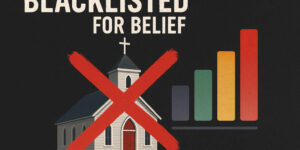Study: Most U.S. Churches Aren’t Engaged in ‘Worship Wars’ Anymore
For most pastors, the so-called “worship wars” over the style of the music used in their church have subsided, if they ever even felt that pressure.
A new study from Nashville-based LifeWay Research found 15% of Protestant pastors in the U.S. say the biggest challenge they face in the area of music is navigating the varying preferences of members.
A similar number of pastors say their most significant challenge is leading people to truly worship God (16%). More pastors say they struggle with finding musicians and vocalists (21%).
Fewer say their biggest challenge is finding a music leader (8%), lacking the finances to do what they want to do (4%), or defining a musical style for their church (3%). A third (33%) say none of those are their primary obstacle.
A previous study from LifeWay Research found 5% of Protestant churchgoers say they would find a new church if the music style changed at their current congregation, far behind issues like the church making a doctrinal shift (54%) or the preaching style changing (19%).
Mike Harland, director of LifeWay Worship, believes this is evidence of a worship war peace treaty. “The distance between what used to be traditional and contemporary are much closer than what they were 20 years ago,” he said. “Disagreement has begun to wain in most churches, and what a wonderful thing that is.”
Pastors of churches with the fewest attendees (less than 50) are the least likely to say their biggest challenge is navigating music preferences (7%).
The youngest pastors, those 18 to 44, are more likely than the oldest pastors, those 65 and older, to say finding musicians and vocalists is their biggest challenge (24% to 16%).
Pianos Top Church Charts
The piano remains the primary instrument used in churches. Around 4 in 5 Protestant pastors (79%) say piano music is a regular part of their worship service music. Songs using hymnals (69%) also remain popular.
More pastors say their services regularly feature songs led by an individual worship leader (60%) than songs led by a praise team (52%) or songs led by the choir (33%).
Around half of churches regularly feature organ music (47%) or a praise band (46%).
Fewer pastors say songs featuring only the choir (32%) or songs using accompaniment tracks (22%) are a regular part of their worship service music. Close to 1 in 10 (9%) say they regularly include orchestra music.
“With all the changes in church music over the past few decades, there are also many similarities between worship services today and those from past decades,” said Scott McConnell, executive director of LifeWay Research. “Like printed books, hymnals are far from obsolete. Individuals and groups are still leading congregations in singing together each week.”
African-American pastors (48%) are more likely than white pastors (32%) to say their church regularly includes songs featuring only the choir in their worship services.
Pastors of the smallest churches (less than 50 in attendance) are the least likely to say they regularly have songs featuring only the choir or songs led by the choir (both 21%).
More than twice as many churches with less than 50 in attendance (85%) say they use hymnals in their worship service as churches with 250 or more (41%).
Churches with 250 or more in attendance, however, are the most likely to regularly feature a rhythm section or praise band music (75%) and songs led by a praise team (79%).
Pastors at Pentecostal churches are most likely to say their church worship services feature songs led by a praise team (82%) and praise band music (73%). Pentecostal church pastors are also the least likely to say they regularly sing songs from a hymnal (32%).
Lutheran pastors (88%) are the most likely to say their worship services regularly have organ music.
Pastors of churches in the Northeast (58%) and Midwest (54%) are also more likely to say they have organ music than those in the South (43%) and West (36%).
Working Together
Most Protestant pastors say they maintain a harmonious relationship with the church’s music leader.
More than 9 in 10 pastors (92%) say they and their church music leader have high levels of mutual respect, while 71% say they collaborate a lot in planning worship services.
Almost 3 in 5 pastors (57%) say they spend time with the church music leader beyond where their church work overlaps.
Fewer pastors describe their relationship with the music leader as one where they tolerate each other (51%), work independently (40%), or often only see each other at worship services (27%).
A small number of pastors say the relationship is often tense (4%) or that they serve as the music leader along with being the pastor (3%).
“Because the worship service is a shared ministry with the pastors and worship leader, it’s vital they be on the same page,” said Harland.
“The dynamic of their relationship is vital to the worship leadership being done the right way. The church greatly benefits when this relationship is right, but it can be hindered when the relationship is less than it could be.”
Pastors of churches with 250 or more in attendance are the most likely to say they collaborate a lot with the music leader in planning the worship service (84%).
Smaller church pastors, those with worship service attendance of less than 50 (37%) and 50 to 99 (29%), are more likely to say they often only see the music leader at worship services than larger church pastors, those with attendance of 100 to 249 (22%) and 250 or more (16%).
Pay to Play
Within the past year, most churches (73%) have paid for at least some of the musical portions of their worship service.
Almost half of pastors (47%) say their church has paid the music leader or minister. Two in 5 (40%) say they’ve paid special musical guests.
Churches are almost twice as likely to say they’ve paid musicians and accompanists who are members of their church (33%) than musicians and accompanists who play regularly but are not members (18%).
Fewer say they paid for vocalists who are members of the church (15%) or vocalists who sing regularly but aren’t members (10%).
Around a quarter of Protestant pastors (27%) say they haven’t paid for any of those in the past year.
“Many churches are able to meet their typical musical needs without paying musicians and vocalists,” said McConnell. “But churches are not isolated. They tap into talent from other churches when needed, and many intentionally use musical guests to enhance worship experiences.”
Pastors of churches with attendance of 250 or more are the most likely to say they paid their music leader or minister (68%).
Presbyterian or Reformed pastors are the most likely to say they paid vocalists who sing regularly but are not members of their church (24%).
African-American pastors are the most likely to say they paid musicians and accompanists who are members of their church (53%).
“Singing corporately with the body of Christ is something every disciple should care about because it is something God commanded us to do,” said Harland. “Colossians 3:16 says, ‘Let the word of Christ dwell richly among you, in all wisdom teaching and admonishing one another through psalms, hymns and spiritual songs, singing to God with gratitude in your hearts.'”
For Harland, this gives churchgoers motivation to worship with their voices. “We sing because we have a song,” he said.
“We sing because we teach and admonish one another. We sing because it inspires us to be faithful in our following of Christ. We sing because He is worthy of the song.” {eoa}
Aaron Earls is a writer for LifeWay Christian Resources.
For the original article, visit lifeway.com.






































